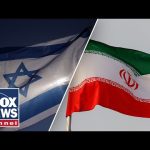Tensions are swirling in the Middle East, and it seems like a chess game where nobody can remember the rules. Recent military actions by Israel against Iran have left many wondering what the next move will be, especially in light of Iran’s threats to retaliate. It’s a situation with everyone on the edge of their seats, trying to decipher the complexities of this never-ending conflict.
As highlighted by esteemed military experts, Israel’s recent strikes were primarily aimed at Iranian air defense systems. This raises a question: Is Israel merely poking the bear, or do they have a grander strategy? One expert pointed out that while Israel is responding to provocations, there seems to be hesitation regarding whether to hit Iran’s critical military and nuclear sites. This hesitation prompts inquiry: where is the line drawn in this ongoing struggle?
It’s interesting to note that during the previous administration, Iran was feeling the pinch of sanctions and was, in fact, “broke.” However, with current shifts in policy, Iran has not only regained some economic footing. Still, it has also become a bigger player on the world stage, frustrating many who remember how things were. The change in strategy also raises eyebrows—why would the current leadership put the onus on Israel to handle a threat that has global implications?
Among Arab nations, reactions have been muted. Some have condemned Israel’s actions, but this response lacks the passion one might expect. One could speculate that behind closed doors, many Arab leaders might cheer on Israel’s actions against Iran, realizing they share a common adversary. In some ways, it’s a twisted version of “the enemy of my enemy is my friend.” But publicly, they must toe the party line for political correctness. One must wonder what these leaders think as they watch the chaos unfold.
What’s next? If Iran follows through with its threats of a measured response, we could be caught in a loop—a tit-for-tat cycle similar to a dog chasing its tail. This raises the stakes for global players, especially with upcoming elections that could alter how foreign policy shapes up. Will the approach change? Or will ongoing chaos be the norm? The world is waiting to see if there’s a viable end strategy or if we’re all in for a seemingly endless series of conflicts.
In the end, one thing is clear: the complexities of Middle Eastern politics make for a tangled web of responses, reactions, and strategies. As nations vie for control and influence, it’s a high-stakes game where the rules seem non-existent, and the future remains uncertain. It’s both bewildering and captivating, leaving the world grappling with the essence of power, diplomacy, and the quest for stability.




